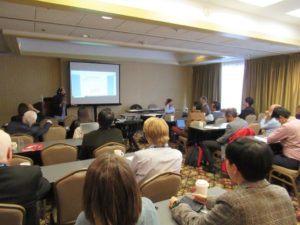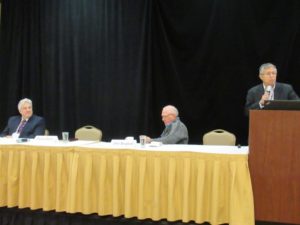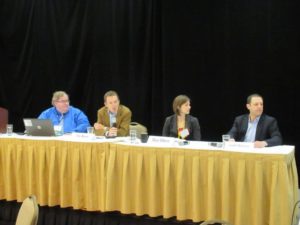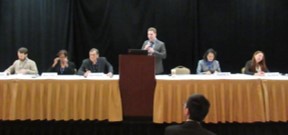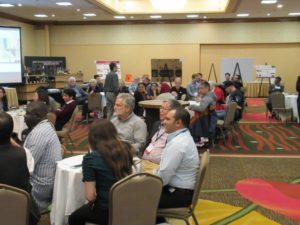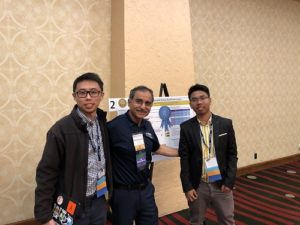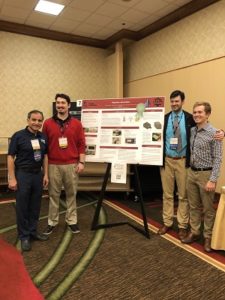| Project power shoe: Piezoelectric wireless power transfer A mobile charging technique | P Joses Paul ; R Samuel Desmond Tutu ; W Kevin Richards ; V Maria Jerome | 2015 IEEE Global Humanitarian Technology Conference (GHTC) | Publication Year: 2015, Page(s): 334 - 339 |
| Disaster management in India An analysis using COBIT 5 principles | Chippi Mohanan ; Vivek Menon | 2016 IEEE Global Humanitarian Technology Conference (GHTC) | Publication Year: 2016, Page(s): 209 - 212 |
| Development of a power source for rural electriciation | David Xu ; Nicholas S. Powers ; Worawut Sae-Kok | 2015 IEEE Global Humanitarian Technology Conference (GHTC) | Publication Year: 2015, Page(s): 340 - 347 |
| OpenPLC: An open source alternative to automation | Thiago Rodrigues Alves ; Mario Buratto ; Flavio Mauricio de Souza ; Thelma Virginia Rodrigues | IEEE Global Humanitarian Technology Conference (GHTC 2014) | Publication Year: 2014, Page(s): 585 - 589 |
| Development and evaluation of solar powered sprayer with multi-purpose applications | D. Yallappa ; Vijayakumar Palled ; M. Veerangouda ; Sushilendra | 2016 IEEE Global Humanitarian Technology Conference (GHTC) | Publication Year: 2016, Page(s): 1 - 6 |
| Access to prosthetic devices in developing countries: Pathways and challenges | Martin Marino ; Shaan Pattni ; Max Greenberg ; Alex Miller ; Emma Hocker ; Sarah Ritter ; Khanjan Mehta | 2015 IEEE Global Humanitarian Technology Conference (GHTC) | Publication Year: 2015, Page(s): 45 - 51 |
| A review of current upper-limb prostheses for resource constrained settings | Brienna Phillips ; Gabrielle Zingalis ; Sarah Ritter ; Khanjan Mehta | 2015 IEEE Global Humanitarian Technology Conference (GHTC) | Publication Year: 2015, Page(s): 52 - 58 |
| Characteristics of a 3D-printed prosthetic hand for use in developing countries | Corinne Dally ; Daniel Johnson ; Moriah Canon ; Sarah Ritter ; Khanjan Mehta | 2015 IEEE Global Humanitarian Technology Conference (GHTC) | Publication Year: 2015, Page(s): 66 - 70 |
| Optical sensing system for detecting water adulteration in milk | Aditya Dave ; Dishant Banwari ; Satyam Srivastava ; Shashikant Sadistap | 2016 IEEE Global Humanitarian Technology Conference (GHTC) | Publication Year: 2016, Page(s): 634 - 639 |
| Determining the effects of load-shedding on residential electricity consumption using meter data A case study of Kitwe, Zambia | D. Mulongoti ; G. Mugala ; B. Kumwenda ; H. Louie | 2016 IEEE Global Humanitarian Technology Conference (GHTC) | Publication Year: 2016, Page(s): 488 - 494 |
| Magnetic Resonance Coupling Modelling for Electric Vehicles Wireless Charging | Erhuvwu Ayisire ; Adel El-Shahat ; Adel Sharaf | 2018 IEEE Global Humanitarian Technology Conference (GHTC) | Publication Year: 2018, Page(s): 1 - 2 |
| IoT Sensor Network Approach for Smart Farming: An Application in Food, Energy and Water System | Yemeserach Mekonnen ; Lamar Burton ; Arif Sarwat ; Shekhar Bhansali | 2018 IEEE Global Humanitarian Technology Conference (GHTC) | Publication Year: 2018, Page(s): 1 - 5 |
| Development and evaluation of drone mounted sprayer for pesticide applications to crops | D. Yallappa ; M. Veerangouda ; Devanand Maski ; Vijayakumar Palled ; M. Bheemanna | 2017 IEEE Global Humanitarian Technology Conference (GHTC) | Publication Year: 2017, Page(s): 1 - 7 |
| High quality, low cost education with the Raspberry Pi | Narasimha Saii Yamanoor ; Srihari Yamanoor | 2017 IEEE Global Humanitarian Technology Conference (GHTC) | Publication Year: 2017, Page(s): 1 - 5 |
| IoT-enabled air quality monitoring device: A low cost smart health solution | Akshata Tapashetti ; Divya Vegiraju ; Tokunbo Ogunfunmi | 2016 IEEE Global Humanitarian Technology Conference (GHTC) | Publication Year: 2016, Page(s): 682 - 685 |
| Electronic load controller (ELC) design and simulation for remote rural communities: A powerhouse ELC compatible with household distributed-ELCs in Nepal | J. Chan ; W. Lubitz | 2016 IEEE Global Humanitarian Technology Conference (GHTC) | Publication Year: 2016, Page(s): 360 - 367 |
| Smart irrigation using low-cost moisture sensors and XBee-based communication | A. Kumar ; K. Kamal ; M. O. Arshad ; S. Mathavan ; T. Vadamala | IEEE Global Humanitarian Technology Conference (GHTC 2014) | Publication Year: 2014, Page(s): 333 - 337 |
| Automated microscopy and machine learning for expert-level malaria field diagnosis | Charles B. Delahunt ; Courosh Mehanian ; Liming Hu ; Shawn K. McGuire ; Cary R. Champlin ; Matthew P. Horning ; Benjamin K. Wilson ; Clay M. Thompon | 2015 IEEE Global Humanitarian Technology Conference (GHTC) | Publication Year: 2015, Page(s): 393 - 399 |
| MedizDroids Project: Ultra-low cost, low-altitude, affordable and sustainable UAV multicopter drones for mosquito vector control in malaria disease management | John-Thones Amenyo ; Daniel Phelps ; Olajide Oladipo ; Folly Sewovoe-Ekuoe ; Sangeeta Jadoonanan ; Sandeep Jadoonanan ; Tahseen Tabassum ; Salim Gnabode ; Tanging D Sherpa ; Michael Falzone ; Abrar Hossain ; Aerren Kublal | IEEE Global Humanitarian Technology Conference (GHTC 2014) | Publication Year: 2014, Page(s): 590 - 596 |
| New aspect for organic farming practices: Controlled crop nutrition and soilless agriculture | P.J. Mahesh ; Minhas Naheem ; Razak Mubafar ; S Shyba ; Sunitha Beevi | 2016 IEEE Global Humanitarian Technology Conference (GHTC) | Publication Year: 2016, Page(s): 819 - 824 |
| Domestic electric consumers response to load-shedding: A case study of Kitwe, Zambia | Robert Ngoma ; Abel Tambatamba ; Benta Oyoo ; Henry Louie | 2016 IEEE Global Humanitarian Technology Conference (GHTC) | Publication Year: 2016, Page(s): 481 - 487 |
| Simplified modeling of a PV panel by using PSIM and its comparison with laboratory test results | Adil Salman ; Arthur Williams ; Hanya Amjad ; M. Kamran Liaqat Bhatti ; M. Saad | 2015 IEEE Global Humanitarian Technology Conference (GHTC) | Publication Year: 2015, Page(s): 360 - 364 |
| 3D printing for disaster preparedness: Making life-saving supplies on-site, on-demand, on-time | Srinivas Saripalle ; Humanitarian Maker ; Abi Bush ; Naiomi Lundman | 2016 IEEE Global Humanitarian Technology Conference (GHTC) | Publication Year: 2016, Page(s): 205 - 208 |
| Development of double burner smart electric stove powered by solar photovoltaic energy | S. Siddiqua ; S. Firuz ; B. M. Nur ; R. J. Shaon ; S. J. Chowdhury ; A. Azad | 2016 IEEE Global Humanitarian Technology Conference (GHTC) | Publication Year: 2016, Page(s): 451 - 458 |
| LIFESUIT Exoskeleton Gives the Gift of Walking so They Shall Walk | Monty K Reed | IEEE Global Humanitarian Technology Conference (GHTC 2014) | Publication Year: 2014, Page(s): 382 - 385 |
| Applications of Wood's Lamp technology to detect skin infections in resource-constrained settings | Holly Cardillo ; Jennifer Kohler ; Ellie Kriner ; Khanjan Mehta | IEEE Global Humanitarian Technology Conference (GHTC 2014) | Publication Year: 2014, Page(s): 548 - 554 |
| Off-grid, low-cost, electrical sun-car system for developing countries | Otward M. Mueller ; Eduard K. Mueller | IEEE Global Humanitarian Technology Conference (GHTC 2014) | Publication Year: 2014, Page(s): 14 - 17 |
| Supporting immunization programs with improved vaccine cold chain information systems | Richard Anderson ; Trevor Perrier ; Fahad Pervaiz ; Norasingh Sisouveth ; Bharath Kumar ; Sompasong Phongphila ; Ataur Rahman ; Ranjit Dhiman ; Sophie Newland | IEEE Global Humanitarian Technology Conference (GHTC 2014) | Publication Year: 2014, Page(s): 215 - 222 |
| Internet of Things (IoT): A relief for Indian farmers | Nishant Kumar Verma ; Adil Usman | 2016 IEEE Global Humanitarian Technology Conference (GHTC) | Publication Year: 2016, Page(s): 831 - 835 |
| MyVoxDevice for the communication between people: blind, deaf, deaf-blind and unimpaired | Fernando Ramirez-Garibay ; Cesar Millan Olivarria ; Alejandro Federico Eufracio Aguilera ; Joel C. Huegel | IEEE Global Humanitarian Technology Conference (GHTC 2014) | Publication Year: 2014, Page(s): 506 - 509 |
| Multi-Stage Organic Water Filter system | Eobin Alex George ; Gaurav Tiwari | IEEE Global Humanitarian Technology Conference (GHTC 2014) | Publication Year: 2014, Page(s): 458 - 461 |
| Global social acceptance of prosthetic devices | Adam Arabian ; Dante Varotsis ; Caitlin McDonnell ; Elinor Meeks | 2016 IEEE Global Humanitarian Technology Conference (GHTC) | Publication Year: 2016, Page(s): 563 - 568 |
| Autonomous OCR dictating system for blind people | Christos Liambas ; Miltiadis Saratzidis | 2016 IEEE Global Humanitarian Technology Conference (GHTC) | Publication Year: 2016, Page(s): 172 - 179 |
| Simulation Study of Load Frequency Control of Single and Two Area Systems | Adil Usman ; BP Divakar | 2012 IEEE Global Humanitarian Technology Conference | Publication Year: 2012, Page(s): 214 - 219 |
| Application and modification of Design for Manufacture and Assembly principles for the developing world | Amy E. Wood ; Charles D. Wood ; Christopher A. Mattson | IEEE Global Humanitarian Technology Conference (GHTC 2014) | Publication Year: 2014, Page(s): 451 - 457 |
| Energy storage integrated solar stove: A case of solar Injera baking in Ethiopia | Asfafaw Haileselassie Tesfay ; Ole Jorgen Nydal ; Mulu Bayray Kahsay | IEEE Global Humanitarian Technology Conference (GHTC 2014) | Publication Year: 2014, Page(s): 659 - 666 |
| The IncuLight: Solar-powered infant incubator | Virginia Hall ; Eric Geise ; Nasser H Kashou | IEEE Global Humanitarian Technology Conference (GHTC 2014) | Publication Year: 2014, Page(s): 223 - 226 |
| Solar based lemon grass essential oil distillation for sustainability and livelihood in tribal community | Udaya Bhaskar Reddy Ragula ; Sriram Devanathan ; Renjith Mohan | 2016 IEEE Global Humanitarian Technology Conference (GHTC) | Publication Year: 2016, Page(s): 738 - 744 |
| RFID based vehicle identification during collisions | Nayan Jeevagan ; Pallavi Santosh ; Rishabh Berlia ; Shubham Kandoi | IEEE Global Humanitarian Technology Conference (GHTC 2014) | Publication Year: 2014, Page(s): 716 - 720 |
| Sustainable development through the use of solar energy for productive processes: The Ayllu Solar Project | Paulina Ramirez-Del-Barrio ; Patricio Mendoza-Araya ; Felipe Valencia ; Gonzalo León ; Lorena Cornejo-Ponce ; Marcia Montedonico ; Guillermo Jiménez-Estévez | 2017 IEEE Global Humanitarian Technology Conference (GHTC) | Publication Year: 2017, Page(s): 1 - 8 |
| High yield groundnut agronomy: An IoT based precision farming framework | P. Rekha ; Venkata Prasanna Rangan ; Maneesha V. Ramesh ; K. V. Nibi | 2017 IEEE Global Humanitarian Technology Conference (GHTC) | Publication Year: 2017, Page(s): 1 - 5 |
| LED street lighting as a strategy for climate change mitigation at local government level | Roberto Barraza García ; Gilberto Velázquez Angulo ; Jaime Romero González ; Edith Flores Tavizón ; José Ignacio Huertas Cardozo | IEEE Global Humanitarian Technology Conference (GHTC 2014) | Publication Year: 2014, Page(s): 345 - 349 |
| Technologies for rehabilitation: Problems and opportunities in the Physiotherapy Clinic at PUC Minas - Brazil | Angélica Rodrigues Araujo ; Márcia L. Drumond das Chagas e Vallone ; Isabella Cristina Dante Perdigão ; Sara Gladys Fernandes Amaral ; Thelma Virginia Rodrigues ; Carlos Augusto Paiva da Silva Martins ; Plínio Soares Paolinelli Maciel | IEEE Global Humanitarian Technology Conference (GHTC 2014) | Publication Year: 2014, Page(s): 402 - 407 |
| Vortex Bladeless Wind Generator for Nano-Grids | Adel El-Shahat ; Md-Mehedi Hasan ; Yan Wu | 2018 IEEE Global Humanitarian Technology Conference (GHTC) | Publication Year: 2018, Page(s): 1 - 2 |
| Modular converter system for low-cost off-grid energy storage using second life li-ion batteries | Christoph R. Birkl ; Damien F. Frost ; Adrien M. Bizeray ; Robert R. Richardson ; David A. Howey | IEEE Global Humanitarian Technology Conference (GHTC 2014) | Publication Year: 2014, Page(s): 192 - 199 |
| Project Stay Alert | Nayan Jeevagan ; Pallavi Santosh ; Rishabh Berlia ; Shubham Kandoi | IEEE Global Humanitarian Technology Conference (GHTC 2014) | Publication Year: 2014, Page(s): 711 - 715 |
| ICT based solutions for education in rural India- A case study | Jineet Doshi | IEEE Global Humanitarian Technology Conference (GHTC 2014) | Publication Year: 2014, Page(s): 302 - 306 |
| Economically designed solar car for developing countries (Pakistan) | M. Farooq ; Adil Salman ; Sohaib Ahmad Siddiqui ; M. Ibrahim Khalil ; Wasim Mukhtar | IEEE Global Humanitarian Technology Conference (GHTC 2014) | Publication Year: 2014, Page(s): 356 - 360 |
| Monitoring system for deep-seated landslides using locally-developed tilt and moisture sensors: System improvements and experiences from real world deployment | Joel S. Marciano ; Calvin G. Hilario ; Mary Ann B. Zabanal ; Earl V. Mendoza ; Brian L. Gumiran ; BenJeMar F. Flores ; Mark O. Peña ; Kennex H. Razon | IEEE Global Humanitarian Technology Conference (GHTC 2014) | Publication Year: 2014, Page(s): 263 - 270 |
| Deep Learning Based Image Classification for Remote Medical Diagnosis | Juliana Shihadeh ; Anaam Ansari ; Tokunbo Ozunfunmi | 2018 IEEE Global Humanitarian Technology Conference (GHTC) | Publication Year: 2018, Page(s): 1 - 8 |
| | | |
| Reported from IEEE Xplore thru 2019 | | | |






